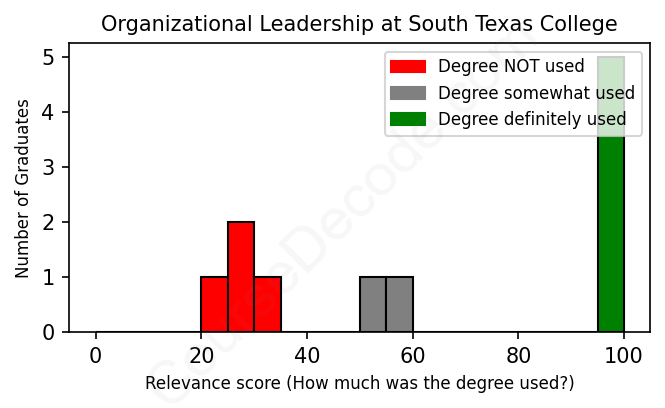
First, some facts. Of the Organizational Leadership graduates from South Texas College we've analyzed , here's how many have used (or NOT used) their degree in their career:

These are estimates based on AI analysis of 11 LinkedIn profiles (see below).
The verdict? Slightly below average. Overall, with an average relevance score of 65%, Organizational Leadership graduates from South Texas College have a slightly lower likelihood (-2%) of finding work in this field compared to the average graduate across all fields:
And for comparison, here's the chart for all profiles we've looked at across all degrees.
Also, after graduating, 72% of these graduates have pursued further education other than another Bachelor's degree (such as a Masters degree or other), compared to the average across all profiles of 35%. This suggests you may need more than just a Bachelors degree to be competitive as a Organizational Leadership graduate.
See the details:
|
Relevance score: 50% We think this person has gone into a career only somewhat relevant to their degree. We think this person has gone into a career only somewhat relevant to their degree.
DEGREE INFOGraduated in 2020 from South Texas College with a Bachelor's degree in Organizational Leadership. Also pursued further education since (see below). JOB HISTORY SINCE GRADUATIONProject Manager C Side Decorating Inc May 2022 - Present FURTHER DEGREES DONE SINCE GRADUATINGMaster of Arts- Global Transformational LeadershipBakke Graduate University 2019 - 2024 ABOUTExperienced Construction and Project Manager with a demonstrated history of working in the for profit and non-profit organization management industry. Skilled in Lean Construction, Volunteer Management, Organizational Leadership, Volunteer Training, Agriculture, Humanitarian Aid and Construction. Strong operations professional with a Bachelor's degree and Masters degree (Expected) focused in Global Transformational Leadership from Bakke Graduate University. |
The top 10 most common jobs done by the graduates we've analyzed (ranked most common to least) are:
When looking at the various jobs held by graduates of the Organizational Leadership program at South Texas College, a clear trend emerges: many of them have stepped into roles within the healthcare and education sectors. A significant number have taken positions as Administrators in Training and Nursing Home Administrators, which are directly tied to the skills learned in their degree, such as management and operational leadership. Others have found a niche in teaching, serving as adjunct instructors or continuing education instructors, where they can apply their knowledge of organizational concepts to educate others. These roles, particularly in healthcare and education, heavily require the organizational leadership skills that these graduates have honed during their studies, making their job choices very relevant to their degree.
However, not all paths taken by these graduates are directly aligned with their degree. Some have ventured into fields like digital management, security, and tax solutions, where the connection to organizational leadership is less pronounced. Positions like Virtual Assistant or Technology Support might utilize some organizational skills, but they don't deeply engage with the core leadership concepts from their education. Overall, while many graduates have found meaningful work that resonates with their studies in Organizational Leadership, others have drifted into roles that wouldn't necessarily leverage their specific training, highlighting that degree relevance can vary significantly across job types.
Here is a visual representation of the most common words in job titles for Organizational Leadership graduates (this is across all Organizational Leadership graduates we've analyzed, not just those who went to South Texas College):

Based on the LinkedIn profiles of graduates from South Texas College who studied Organizational Leadership, it looks like the career trajectories are quite diverse, but many of them have found jobs that are relevant to their degree. Many of the graduates tend to start off in entry-level positions related to administration or community relations, which is to be expected. For instance, we see roles such as Administrator in Training and Coordinator of Community Relations for those starting out just a couple of years after graduation.
Fast forward a few years, and many graduates seem to move up the ladder into more responsible and specialized roles. Some have taken on leadership positions like Nursing Home Administrator and Project Manager, indicating a transition into serious managerial roles. By the five to ten-year mark, many alumni have established themselves in significant leadership positions or as independent business owners, showing that a degree in Organizational Leadership can lead to solid career advancements. Overall, it seems like these graduates are leveraging their education well, with many finding satisfactory careers in management or starting their own businesses, rather than struggling to find work unrelated to their field of study.
Hey there! So, getting a Bachelor’s degree in Organizational Leadership, like the one offered at South Texas College, is generally considered to be on the easier side compared to more technical or rigorous degrees. While it definitely requires some effort—you’ll have to read, write papers, and participate in group projects—it tends to focus on concepts rather than complex math or science. Most students find the materials relatable since they cover things like teamwork, communication, and ethics in organizations, which are pretty accessible topics. If you stay organized and engaged, you should be able to handle it without too much stress!
Most commonly, in the LinkedIn profiles we've looked at, it takes people 1 years to finish a Bachelor degree in Organizational Leadership.
From what I see, it looks like the Organizational Leadership graduates from South Texas College are on different financial paths. Some of them, like the Nursing Home Administrator and the Regional Direct Services Manager, probably made decent salaries, especially with those positions' responsibilities and growth potential. However, others, like the Adjunct Instructor or various administrative roles, might not be raking in the big bucks quite yet. The independent business owners especially could have varying levels of income depending on how well their ventures are doing. Overall, it seems like they’re getting their careers started and will likely see their earnings grow with experience and promotions, but right now, it might be a mixed bag regarding how much they're making.
Here is a visual representation of the most common words seen in the "about" section of LinkedIn profiles who have a Bachelor degree in Organizational Leadership (this is across all Organizational Leadership graduates we've analyzed, not just those who went to South Texas College). This may or may not be useful:

Here are all colleges offering a Bachelor degree in Organizational Leadership (ordered by the average relevance score of their Organizational Leadership graduates, best to worst) where we have analyzed at least 10 of their graduates:
| College | Score | Count |
|---|---|---|
 Texas A&M University-Commerce Texas A&M University-Commerce
|
74 | 16 |
 Arizona State University Arizona State University
|
72 | 23 |
 University of Louisville University of Louisville
|
69 | 10 |
 Purdue University Purdue University
|
67 | 12 |
 University of Charleston University of Charleston
|
67 | 17 |
 University of Cincinnati University of Cincinnati
|
66 | 13 |
 Trident University International Trident University International
|
65 | 10 |
 South Texas College South Texas College
|
65 | 11 |
 Southern Nazarene University Southern Nazarene University
|
63 | 15 |
 Ashford University Ashford University
|
58 | 20 |
 Azusa Pacific University Azusa Pacific University
|
58 | 11 |
 Northern Kentucky University Northern Kentucky University
|
57 | 25 |
 Wright State University Wright State University
|
52 | 24 |